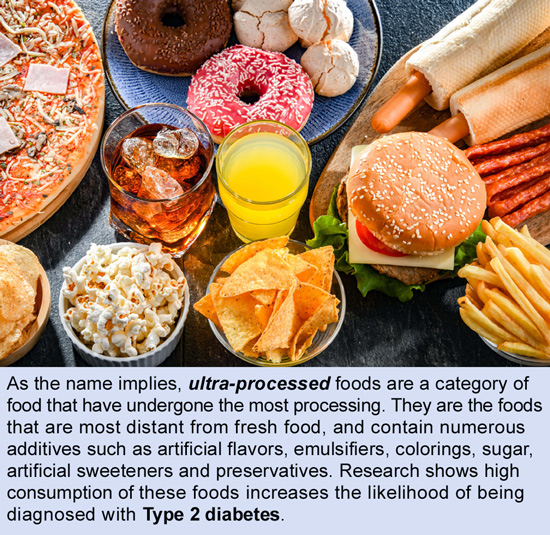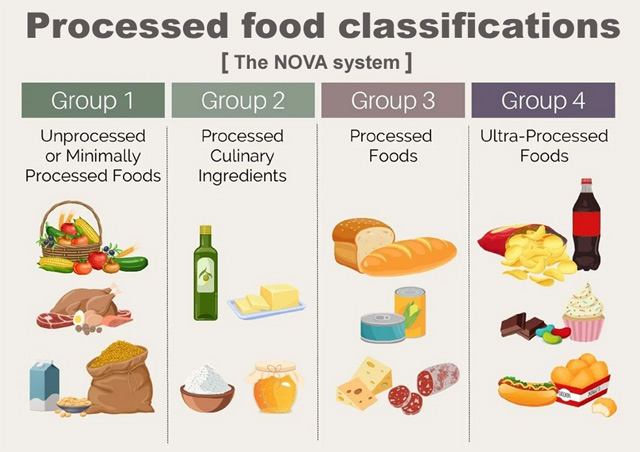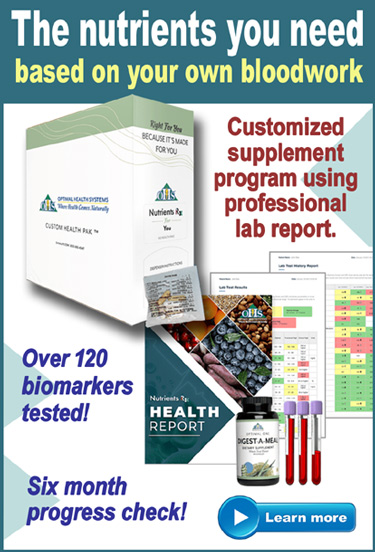A growing body of scientific evidence shows that regular consumption of ultra-processed foods leads to a higher risk of developing Type 2 diabetes.
Type 2 diabetes is vastly different than Type 1 diabetes. Type 1 diabetes is an autoimmune disease with symptoms typically appearing early in life. Meanwhile, Type 2 diabetes appears later in life and—as the research shows—is mostly caused by diet choices and a sedentary lifestyle.
Ultra-processed foods are now at the center of the Type 2 diabetes discussion as more and more people begin to recognize this category of food should be limited in the diet if one wishes to avoid the disease.
Unfortunately, in a “prescription culture” holding people accountable to diet choices is a challenge for health professionals. Moreover, many health professionals themselves are uneducated on nutrition as their education is pharmaceutical-focused.
Whether due to a lack of education for health professionals or general apathy by society as a whole, the result of continuing to consume large quantities of ultra-processed foods is becoming abundantly clear in the demographics: Type 2 diabetes, until recently, had primarily been diagnosed in adults older than the age of 45. But today, more children and young adults are developing Type 2 diabetes.
In the next 40 years, the number of children with the disease is projected to increase by nearly 700%. Genetic factors can play a role in developing the disease, but the main factors for an elevated risk of Type 2 diabetes are lifestyle choices—diet choices, obesity, waist circumference, and a sedentary lifestyle.
2024 has been a watershed year in mounting evidence against ultra-processed foods. Here is a summary of six studies from this pivotal year:
••• 1 •••
• A study published in the Journal of Nutrition in Januray 2024 analyzed ultra-processed food consumption and diabetes risk in the Korean population by assessing the data from more than 7,000 Koreans between the ages of 40 and 69. The researchers concluded: “Compared with the lowest quartile of ultra-processed food intake, the highest quartile was positively associated with diabetes risk.
The researchers noted consumption of carbonated drinks, ham, sausage, instant noodles, and ice cream were particularly notable for their associations with increased risk of type 2 diabetes.
In a call to action in the study’s summary, the researchers wrote: “Public health strategies should also focus on making unprocessed or minimally processed foods more affordable and accessible.”
••• 2 •••
• In an umbrella review published in the British Medical Journal in February 2024 , researchers used data from 45 different studies to examine the consumption of ultra-processed foods relative to the risk of various adverse health outcomes.
Researchers concluded that “the strongest available evidence pertained to direct associations between greater exposure to ultra-processed foods and higher risks of all cause mortality, cardiovascular disease related mortality, common mental disorder outcomes, overweight and obesity, and Type 2 diabetes.”
The researchers conclued their findings by calling for government policies aimed at “reducing dietary exposure to ultra-processed foods for improved human health.”
••• 3 •••
• In a French study published in The Lancet Diabetes & Endocrinology in May 2024 researchers examined emulsifiers to see if they were linked to Type 2 diabetes. Emulsifiers are food additives that are used to mix two or more substances together, and are commonly found in ultra-processed foods.
The researchers concluded: “We found direct associations between the risk of Type 2 diabetes and exposures to various food additive emulsifiers widely used in industrial foods.”
The study incorporated the data of more than 100,000 adults in the French NutriNet-Santé Prospective study.
••• 4 •••
• Another umbrella review was published in Clinical Nutrition in June 2024. In this Chinese medical university review, researchers examined 39 previous meta-analyses do determine associations between ultra-processed food consumption and several different adverse health outcomes, including Type 2 diabetes.
The researchers concluded there was “highly suggestive evidence” that five different health risks—including diabetes mellitus—were associated with high ultra-processed food consumption.
The researchers noted that, in addition to being “a source of endocrine hormone-disrupting chemicals,” ultra-processed foods are “more hyperglycemic than minimally and moderately processed foods due to the altered food structure.”
••• 5 •••
• Another June 2024 study was presented at NUTRITION 2024—the annual meeting of the American Society for Nutrition—but is not let peer reviewed.
In this study, older adults who reported consuming higher amounts of ultra-processed foods (as defined by the NOVA classification system) were about 10% more likely to die over a median follow-up of 23 years compared with those who consumed less processed food.
The research drew data from an impressive tally of 540,000 people who provided information about their eating habits and health starting in the mid-1990s, when they were between 50 and 71 years of age.
••• 6 •••
• A prospective cohort analysis published in The Lancet Regional Health Europe in November 2024, assessed different degrees of food processing relative to incidences of Type 2 diabetes.
The researchers concluded that each 10% increment of total daily food intake from ultru-processed foods was associated with a 17% higher incident Type 2 diabetes mellitus.
Data for the study was culled from the European Prospective Investigation into Cancer and Nutrition.
– – –
Sources: Source links provided with each study above.



